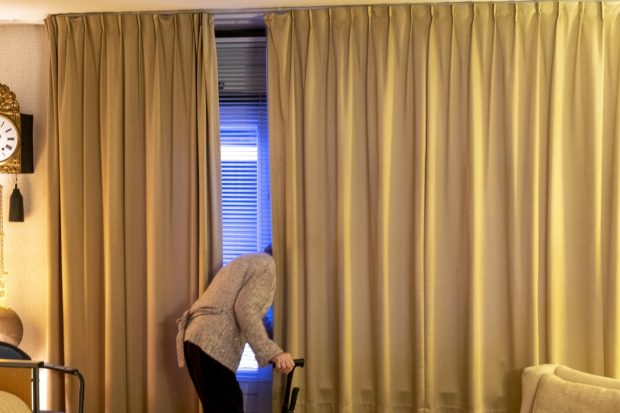March 2, 2024
Perhaps our free choice of euthanasia for dementia is less free than we like to think
We need to talk more to people with dementia
Is our free choice to decide now that we want euthanasia when we become demented really that free, asks Jessie Dezutter in her opinion editorial.
Dear person with dementia,
We often talk about you. We talk about you. Less often we talk to you. That may be because you hold up a mirror to us. A mirror of what our lives might be like in the future. A life that frightens us.
Your mirrored life touches us in the depths of our being, in who we really are. It shows us how we are as human beings: vulnerable and dependent on others.
An image that clashes with the ideal image we are often presented with in our Western society. We need to be healthy, successful, independent and productive.
We need to think critically, act quickly and thoroughly. Only then can we join the rat race of life.
Your life with your dementia is a different race. It forces us to look at our mortality. It makes us question what our lives are worth when we no longer conform to society’s ideal image.
It makes us think about who we are when we are no longer who we used to be. It raises these questions for us: ‘What is the meaning and significance of my life, of your life? Do I still matter?
What purpose does my life (still) have? How do I stay connected to others, to life? Where does my freedom lie? Your life raises existential questions inherent in every human life.
The question of freedom plays especially hard when we talk about you, a person with dementia. It is, after all, about our freedom.
Our freedom to decide that we don’t want a life like yours, don’t even want to risk such a life. Our freedom to end our lives if we were to have a life like yours.
Our freedom to seek help to do so from the medical profession to assist us in that autonomous and freely made decision. The decision to choose euthanasia.
The decision to choose euthanasia appears to be a rational, reasoned, and freely made choice. The decision of an independent, autonomous person. But this seems less clear-cut than first thought.
The call of semi-freedom
To begin with, choice is not independent. Euthanasia is an act by another person to end one’s own life.
This shakes the idea of individual freedom. It is no longer about one’s own autonomous and individual choice, independent of others, but a relationship between individuals.
A relationship in which one person depends on another person for their ‘free’ choice.
Furthermore, a choice implies that there are several choices. Only then can one speak of a ‘free’ choice.
Yet only limited attention, money and resources seem to go into seeking, exploring and improving alternatives. Palliative care for people with dementia receives limited attention and is often unknown to people outside elder care.
There is less debate about the possible role of pain management or palliative sedation in the suffering of people with dementia. The choice of euthanasia can only truly be a free choice if we also adequately invest in and inform about the alternatives.

Finally, the free choice we take as a person without dementia about our future also involves taking that free choice away from our future self with possible dementia.
We decide now that future life will not be worth living, even though we do not know if we will feel the same way as a person with dementia. The person without dementia thus gains more freedom and autonomy than the future person with dementia.
Besides questioning whether our free choice is so free and independent, we should also dare to think about the mirror that people with dementia hold up to us.
They tell us their story and point out our story: the essence of our lives. Do we talk to people with dementia often enough to know what their lives are like?
Do we sit with them when talking no longer works so as to get to know their lives? Or do we (wrongly?) allow ourselves to be led by the strong call of a (semi-)freedom and therefore pay little attention to that quiet but crucial voice?
Your voice, person with dementia.
Originally published in Dutch.
Jessie Dezutter is Professor of existential geriatric psychology at KU Leuven (Belgium). She lost her grandmother to alzheimer’s.
Editorial Note – In the Netherlands and Belgium, a request for euthanasia can be included in an advance health directive. This means that should you develop dementia at some time in the future, a doctor can administer a lethal injection because you gave this instruction when you still had mental capacity.
This procedure is unpopular with doctors.